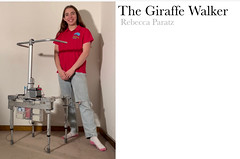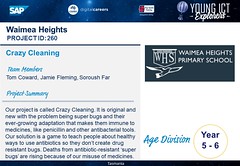New South Wales
Year 3 – 4
First Place
Extinction is not an Option: Zoo Enclosure for the Sumatran Rhino
Lucy Sultana, Erica Natawardaja
Loreto Kirribilli
We have been learning about sustainable practices that can support the natural vegetation, climate and native animals of Australia and Indonesia (Sumatra Rainforest). We have been using our critical thinking, creativity, collaboration and communication to plan, design and create a digital zoo enclosure for the Sumatran Rhino which is critically endangered. There are under 80 left and one of the rarest species in the world. This enclosure aims to address the specific needs of the Sumatran Rhino while also considering the impact that climate and human actions have on living things. We hope to better inform people about the Sumatran Rhinos and what we must do to protect them.
Second Place
Healthy Kids, Healthy Nation
Vihaan Patel, Joshua Price, Jason Xu, Joel Inggall
Oakhill Drive Public School
We have noticed through our design thinking process that some children have daily, unhealthy eating habits. This made us wonder what we could do to promote health in a fun way at school level.
We are to promote healthy eating and physical activity in Primary Schools. Our true mission is, having a healthier, more food-aware school.
Third Place
The Wildfire Alert
Avalon Jankowski
Tarrawanna Public School
Fires are big issue to wildlife because wildfires can hurt wildlife. It can disasterly impact both the environment and wildlife. Trees can burn if fires happen. When wildfires happen if it gets on the trees it will burn them so every time a wildfire happens there are less and less trees then. Animals don’t get homes because there are big wildfires that burn their homes.
Year 5 – 6
First Place
Super Shower Timer
Isobel Tomlins, Daphne Lai, Misato Heming, Hannah Bacigalupo
Wideview Public School
Clean drinking water is one of the world’s most precious resources. How much clean drinking water do you think Australia uses just on showers every day?
Our project, The Super Shower Timer, is designed to gently get someone out of the shower by using coloured LEDs to warn the person when they should be getting out of the shower.
Second Place
Rubbish Drone
Alex Lo, Lachlan Zhao
Barker College Junior School
We want to help clean up rubbish from hard to reach places, such as the bush. We want to make an attachment to go on drones which can raise and lower a bin.
Third Place
Sleepie Head
Zoe Lewis, Annie Keller, Lucy Harris, Sadie McConkey
Loreto Kirribilli
We are solving the problem of unsafe sleeping places. Each night, thousands of homeless, backpackers and campers struggle to find a safe place to sleep. That is where the app Sleepie Head comes in. Our $2.50 premium subscription provides users a camera to take a photo of their environment and the app will decide whether it is safe or unsafe. For our homeless users we have a free survey to test whether your location is a safe place to sleep. Our app also has a list where users can find backpacker hotels, homeless shelters or free accommodation.
Merit Award
The POW
Curtis Fan, Richard Li, Ronald Liu
Barker College Junior School
Our project is a claymation movie about the effects of war. When people watch our movie, we hope they will not start wars.
Year 7 – 8
First Place
UV Light Hamper
Teru Nakazawa, Lily Roffe, Mikayla Whant, Piper Crutchley
Corrimal High School
Do you really think your towels are clean? Well guess what they’re not. Nearly 90% of your bathroom towels are infected with horrible bacteria, called coliform. This bacteria can make you extremely ill. But that’s not it, your bathroom towels can also hold a fatal bacteria, MRSA, this bacteria can become fatal and lead to death. Although this sounds scary, we have a solution. Our UV Light Hamper can be the life changing fix to your dirty, unhealthy, bacteria infected bath towels. The UV lights placed throughout the hamper, not only dry but disinfect your bath towels making them clean, healthy, safe and warm so you enjoy your towel when you get out of the shower.
Second Place
Academ.ai
Alvin Alford
Knox Grammar School
An AI assistive technology for teachers who have trouble teaching technology skills to students.
Third Place
Deaf Sign Communicator
Aaliyah Vourliotis, Alex Newman, Violet O’Donnell, Zander Ibntajuddeen, Noah Blake
Corrimal High School
Year 9 – 10
First Place
Sentralise
Declan Hofmeyr, Louis vanliefland
Independent Entry
Most students have at least 5 different platforms (i.e. Google Classroom, Sentral, Education Perfect, Email, Notion, etc.) that they need to access to find all their work. Sentralise uses a variety of APIs and alternative methods to bring all that data in one, beautiful, easy-to-use dashboard.
Sentralise also offers Sentralise Study, a platform to find revision material, use practice tests and ask questions. For parents, Sentralise also offers the Parent Dashboard, where parents can see an overview of all their children’s assessments and other tasks.
Second Place
Illawarra Water Filtration System
Lexi Williams, Lauren Karbe, Briyanna DeAbrantes
Warrawong High School
Third Place
Mini Map
Deakon Cassidy
Warrawong High School
My project is an interactive digital map of the Illawarra. It is similar to Google Maps, but is on a smaller scale and is more detailed. People with dementia or people who are not good with directions would use this app. It is also useful for people who are not local to the area, as they can use it to locate local shops or places.
Year 11 – 12
First Place
GANdioso
Daniel Wang
North Sydney Boys High School
GANdioso is a desktop application which utilises a Generative Adversarial Network (GAN) to generate piano pieces and outputs PDF sheet music along with MIDI audio. When generating new pieces, a key can be specified and the dissonance, note density and length can be adjusted. Generated pieces are saved to a library where both sheet music and audio can be accessed.
Second Place
Moachopsis
Jessica Gonzalez
St Philip’s Christian College Port Stephen’s
It is a stop motion animatic about mental illness and struggles you have internally, “fighting with yourself”.
Third Place
My Night Out
Caitlin McNally
Loreto Kirribilli
Through a questionnaire that I sent out to my year group, I was able to gather statistics that supported the inspiration of my project. When asked about their sense of safety when out with friends or by themselves, 64.2% said they feel somewhat safe with friends, followed by 29.9% saying they felt safe. In comparison when alone 52.2% said they didn’t feel safe, 29.9% said somewhat and 10.4% said that they never go out alone so this question wasn’t relevant to them.
For this project, I designed and produced an app giving women the opportunity to go out without the fear of something going wrong and being safe out at night and by themselves. The app will have multiple functions to have easy access to different resources, like hotlines, and nearest police stations to insuring the user has a stronger sense of safety or easier access to resources. The target market of my project is teenage girls and women ranging from the ages of 12-50. My project is aimed at teen girls and women who don’t feel safe when going out by themselves. To start the app is targeted at people living in Australia.



